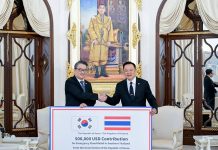BANGKOK, 16 May 2013 – Education has been cited as a key to success in resolving problems in the southern border provinces, restoring peace, and helping in local development.
The Secretary-General of the Southern Border Provinces Administrative Center, Police Colonel Tawee Sodsong, stressed the importance of educational development in strengthening the southern border provinces. Many local community leaders and religious leaders also share the view that education will lead to a sustainable solution to the southern unrest that has continued for nine years now.
Police Colonel Tawee said that the Southern Border Provinces Administrative Center has a mission of developing the quality of life of residents in the deep South through education, religion, and culture in accordance with the local way of living. He hailed Yala Community College in Yala province for its seminar held on 13 May 2013 to discuss the role of students in tackling conflicts in a multicultural society. He said that although the seminar was a small activity, it reflected ways of thinking to ease the unrest in the southern border provinces through the participation of students. Efforts to ease southern problems need the participation of people in all dimensions.
Yala Community College is a state college under the supervision of the Office of the Higher Education Commission, Ministry of Education, but it is managed by the public and private sector joint committee. It was established in 2004 by a Cabinet resolution, as part of the Government’s policy on the development of the southern border provinces. The college offers both diploma programs and short-term vocational courses in response to the local demands. More than 70 percent of the people in Yala are Muslim.
Thailand’s National Education Act stipulates that individuals, families, communities, and social and religious institutions, including non-governmental organizations, shall have the right to provide basic education and shall be entitled to equitable benefits given by the Government. The Muslim youth in Thailand thus have the full liberty to study Islam from a young age in programs offered by various Islamic entities.
Young Muslim Thais in the South are usually enrolled in the pre-school development center (rawdah) run by local mosques. After that, they are enrolled at a center for religious and ethics training (tadika), also run by the local mosques. At the primary and secondary school levels, Muslim Thais are able to choose between attending regular schools, or private Islamic schools (pondok or ponoh), or private schools that offer instruction in both religious studies and regular subjects.
At the university level, the Government established the College of Islamic Studies, Prince of Songkla University, in Pattani province in 1988. Later, in 1998, a private Islamic college was set up in Yala province. Currently, the Government, in collaboration with the Al Azhar University of Egypt, plans to establish another Islamic university in Narathiwat province.
A number of Thai Muslim students receive government scholarships from Muslim countries to pursue their studies abroad, as well, in places such as Saudi Arabia, Egypt, Malaysia, Indonesia, Pakistan, Yemen, and Kuwait.
The Thai government sees the necessity of providing greater educational opportunities for young people in the southern border provinces, so that they are equipped with both vocational training and religious knowledge. It also emphasizes efforts to provide greater employment opportunities for local people as a way to help develop society.




